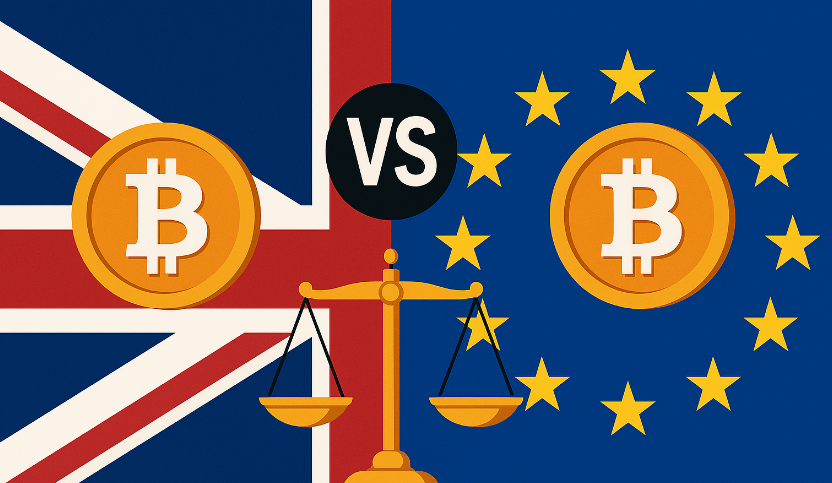The battle for crypto leadership in Europe has never been more intense. In 2025, as the digital asset sector matures, both the United Kingdom and the European Union are racing to position themselves as the go-to hub for crypto innovation, investment, and talent. But with regulatory frameworks diverging post-Brexit, the big question remains: Who’s ahead in the crypto regulation race – the UK or Europe?
The UK and the EU have taken different approaches to regulating crypto assets. The UK favours a more flexible, principles-based approach, aiming to adapt existing financial regulations to crypto, while the EU has opted for a comprehensive, prescriptive framework with its Markets in Crypto-Assets (MiCA) regulation.
The EU’s crypto market is projected to reach nearly $1.9 trillion by the end of 2025, with stronger institutional adoption under MiCA boosting overall growth. In comparison, fewer than 15% of crypto firms have secured FCA approval in the UK so far this year, reflecting a more cautious, quality‑focused approach.
Regulation in Practice: How the UK and EU Rules Really Differ
While both the UK and EU aim to protect investors and build trust in digital assets, their regulatory models have taken distinct paths. The UK’s framework remains more flexible and principles-based, adapting existing financial rules to crypto activities like stablecoins, exchanges, and custody. This means firms must navigate a more selective licensing process, as seen with fewer than 15% of applicants receiving FCA approval so far in 2025, but benefit from agile updates, sandboxes, and closer alignment with other global regimes.
By contrast, the EU’s Markets in Crypto-Assets (MiCA) regulation introduces a single, harmonised rulebook for all 27 member states. From white papers to capital requirements and operational safeguards, MiCA sets clear standards for crypto-asset service providers (CASPs) to operate across borders with one licence. However, this consistency comes at a cost: compliance spending for mid-sized firms has risen significantly, with many smaller players struggling to meet new reporting and staffing obligations.
In practice, the trade-off is clear – the UK’s regime gives firms more room to innovate but with tighter approval thresholds, while MiCA offers legal certainty and market scale in exchange for higher regulatory overheads.
Strategic Moves: Where Crypto Firms and Investors Are Placing Bets in 2025
This divergence in approach is already influencing where crypto businesses choose to expand. Many larger exchanges and fintech players continue to see London as an attractive base for global operations, thanks to its established financial services ecosystem, government support for innovation, and ongoing work to align with US and Asian markets. For firms targeting fast product cycles and evolving retail offerings, the UK’s sandbox and principles-based model remain a draw.
On the other hand, the EU’s single passport for CASPs allows compliant firms to access millions of potential customers across the bloc. This has encouraged institutional players, payment service providers, and stablecoin issuers with enough capital to absorb higher compliance costs to maintain or shift operations to hubs like Frankfurt, Paris, and Amsterdam. Early data shows some startups are choosing a hybrid strategy: securing a UK licence for flexibility while maintaining MiCA approval for broader reach.
Overall, founders and investors are weighing speed and adaptability against certainty and scale. In this race, neither side has a clear lead yet, but both are setting the tone for what trusted, regulated crypto can look like in Europe and beyond.
As the year progresses, the real test will be how each regime balances innovation with stability, and whether crypto companies can navigate both to stay competitive.
Learn more about crypto regulation in the UK and EU by connecting with industry leaders and decision-makers at our upcoming 4th Financial Innovation Forum – Payments & RegTech on 18 September 2025 at the Intercontinental Hotel in Mayfair, London, UK.
Meet leaders from top organisations including: Visa, Santander (PagoNxt), UK Finance, SWIFT, Alipay+, Accenture, Citibank, Wise, Starling Bank, Zempler Bank, EPAM Systems, Global Blockchain Business Council (GBBC), Remitly Europe, Payall Payment Systems, Vixio Regulatory Intelligence, Milicent Labs, AIRWALLEX, Reach, TPICAP, Eudaimon Consulting, BRND WGN, Fnality International, GSMA, Spatzia.eu, Soldo, FTI Consulting, Vivox.AI, ZExcella LTD, JayBee Ltd, Gresham International, Agant and many more!
Secure your spot today to enjoy a 10% discount before it expires! Contact us at [email protected] to claim the discount!
To register and access the agenda: https://bit.ly/3ZDTItJ
For more information on registration, please contact [email protected]
By: Zinah Abdaki, Head of Marketing at QUBE Events

